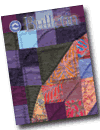|
Spiritual memoir explores heritage, place, relationships
By Rachel Lapp
When Cynthia Yoder ’89 was 26 and she felt as if her life was coming apart at the seams, she took an action both natural and radical: she packed up her New York City life and headed to rural eastern Pennsylvania. A writer with a master of fine arts degree in fiction writing from Sarah Lawrence College, Yoder has written about the multilayered experience in a new book published by Cascadia Publishing House (the emerging new name of Pandora Press).
The book, titled Crazy Quilt: Pieces of a Mennonite Life “depicts the author’s spiritual journey back to her Pennsylvania Dutch Mennonite roots. … As she collects stories from her aging grandparents, Henry and Betts Yoder, and hears how they’ve grappled with their own losses, the young author begins to understand what she needs to do to save herself and her marriage. Crazy Quilt: Pieces of a Mennonite Life – with its stories of past and present, diary entries from Betts, family photographs and recipes – is as much about heritage as it is about the power of love that transcends human limits,” according to its publishing house description.
“I started Crazy Quilt: Pieces of a Mennonite Life when I was suffering from a depression and separated from my husband. My intent was to preserve the stories of my Pennsylvania Dutch Mennonite grandparents, but I couldn’t stop writing,” she said. “I decided to stitch together my story with theirs to show what I learned through living with them for a year. When I left Pennsylvania I was more connected and alive than I’d been for years.”
Yoder’s creative nonfiction and poetry have appeared in national literary publications, including New Jersey Monthly, Netscape.com and Parabola. She also does public relations coaching with small businesses. She has created communities around writing, most notably an All Night Reading of Dante’s Inferno by New York Poets and Writers, which started at New York’s Cathedral of St. John the Divine in 1993; the reading included such luminaries as Susan Sontag and Robert Pinsky. Yoder lives in New Jersey with her husband, Jonathan Shenk ’88, and their son Gabriel.
For more information about the book and Yoder’s chronicling of her family, including photos and audio files, go to Yoder’s Web site at www.cynthiayoder.com; ordering information is also available there. At her public readings of Crazy Quilt, Yoder said she plans to hold a sock drive to benefit the homeless, continuing a tradition established by her grandmother, Betts Yoder, who “mended thousands of pairs of socks in her lifetime for the homeless,” she said.
The following is an excerpt from Crazy Quilt, including two diary entries of Yoder’s grandmother that appear with the selection.
…Betts invited me for lunch later that week. We sat around their white Formica table, the table that reminded me of their old kitchen, the one that now belonged to Aunt Sandi and Uncle Roy. In that kitchen, I played hide-and-seek with cousins, plucked candy and licorice from cabinets, played checkers with my grandmother, and gathered other such memories that gave the kitchen table a set of mysterious powers, such as the ability to make me feel both small and secure, and hungry for pot pie all at once.
Now that Henry had begun talking, he was like one of those old Fords you needed to crank to start – once he got going, he was pretty reliable.
Over slices of pork roast, he recalled, “In the Sixties Henry Paul’s were going mission work in Cuba, and we wanted to go visit. Well, we needed a passport. So, I sent my two dollars to Harrisburg, and they replied, ‘You can’t get a passport.’ I drove out to Harrisburg. I looked at their records. They showed me their library. There they had their book of the census. And in the official book under Yoder were Nelson, Norman, Edna, and Verna, but no Henry.
“I argued with them. I said, ‘Now look. A Henry Yoder has been paying taxes since 1935.’ I said,
‘Where is he? I want to meet him.’”
“‘We don’t know. We have no record of a Henry Yoder.’”
“‘Well, I said, ‘If I claim I’m Henry Yoder, here I stand. Now you say I wasn’t born?’ I don’t know if I said it kindly, but I didn’t feel kindly. They admitted that in 1906 there was a record of a child in the home of Henry Yoder [Sr.]. ‘And,’ they suggested, ‘that may have been you.’ ‘Well,’ I said, ‘Here I stand.’”
I kidded him, “Maybe you were never born.”
“Yes, I just grew up as a weed.”
Betts saw that I’d finished my pork and said, holding the platter out to me, ‘Don’t ya want some more?”
*
Henry and Betts were increasingly becoming “real” to me, like a pair of Velveteen Rabbits. I’d made all kinds of assumptions about their perfection as the family elders, and those assumptions were being worn away. Things didn’t always work out the way they’d planned. Hearing how their lives went made my own situation less freakish – sometimes life just twisted and turned on its own merry course, and you had to keep up some how. I was learning from Henry and Betts that the best thing you could do was to live each day in the best way you knew. I was trying that one – living each day for that day, and not for the future. It was a sort of Zen experiment. I jogged, I wrote, I had conversations. That was my day. My husband was far away, but the day, taken for itself, wasn’t all that bad. Especially now that the sky in my mind was clear in a way it hadn’t been for many years.
My grandparents, as long as I can remember, had a ritual of sitting on the front lawn of my Great Aunt Ruth’s house and watching the colors change over Butter Valley as the sun went down. The view goes on for miles: over houses, tavern, the Catholic chapel, over the farms and wooded hills, over the red brick house where Henry was born. After dinner, one evening in early spring, when it was not yet balmy but we were anxious to begin the ritual again, we pulled out the lounge chairs from the garage and traipsed up the flagstone steps to the front lawn. Last summer we’d sat there, Betts and I shelling the final crop of limas from her garden into bowls. And last fall, we’d put on sweaters and listened to the cicadas calling and answering.
Now the trees were still naked, but birds were singing tentatively, and early buds were on the maple tree behind Aunt Sandi and Uncle Roy’s house. It was the maple tree with leathery bark, in whose shade we held summer family gatherings.
Two cars passed in succession. Henry remarked, “There’s more traffic coming up the Hill nowadays.”
“This isn’t traffic,” I said.
“Oh, no, not after you’ve lived in that city,” Betts said, and I had to smile. “That city” meant a place beyond her understanding or interest. It was the same for computers: she called them “that thing.”
Henry leaned forward on his cane, which he pinched between his knees. He had stumbled a little on his way up the steps from his apartment, and caught himself with it. I’d always thought it was an aesthetic thing: he collected canes. Even though he dressed simply, he did maintain a certain dapper togetherness that was enhanced by the cane. But today it struck me how frail and elderly he really was.
“How about the golf course down there,” Henry said, poking his cane toward the view. “That was the Gehman family farm, where we lived in the Thirties. That used to be my grandfather’s farm, you see. And I’ve always thought that if Grandpa Gehman could look down he’d say, ‘Here’s the old tree where we had the mailbox hung on, and this looks like my farm. But what are they doing, batting little balls around the fields?’ When you think of it that way, it’s kind of a sorry use of the landscape.”
“Not for golfers,” I added, as a devil’s advocate.
“It’s a way to make a living,” Betts said.
“I remember the sledding we used to do there,” Henry said. “We would go all the way up to County Line. There we could start. Across the cornfields, we used to go click, click, click – the cornstalks breaking when we’d go over them with our sled.
“I don’t know,” he mused. “That’s all I remember. That’s one of the reasons I didn’t want to grow old. People become childish when they get old. You can’t remember things. You can’t act right. You stumble around.”
After a while, Aunt Sandi and Uncle Roy appeared with their chairs, and we rearranged ourselves to make a sort of semi-circle facing the valley.
“Well,” my aunt said. “We finally can sit out.” Her tone accused winter for lasting too long.
Talk turned to plantings: what plants would be bought at what greenhouses, and how Zern’s was having a good special on pansies. I was starting to feel less uncomfortable with them, more part of the scenery, like a stone settling comfortably into its place on a wall. The night crept cool onto our backs from the woods above. In summer, fireflies emerge in the field across the road, the same field I pummeled with bare feet as a child, picking bluebottles for my Grammie. Now, there was only the anticipation, the waiting. Still, the air smelled of lilacs, as it always did, even before their season.
A man in a green sedan drove by slowly, honking. We all lifted our hands and waved.
Excerpted from Crazy Quilt: Pieces of a Mennonite Life (Telford, Pa.: DreamSeeker Books, an imprint of Cascadia Publishing House, 2003). Used by permission, all rights reserved.
|


